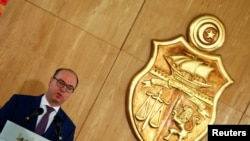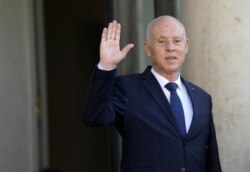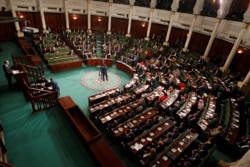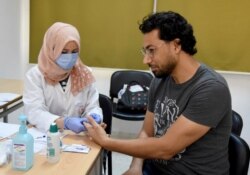Nine months after general elections, Tunisia again faces gridlock, with a fractured and bickering parliament and government in disarray, after last week's resignation of Prime Minister Elyes Fakhfakh.
It's a familiar story for the small, North African country and sole Arab Spring graduate that has lurched from one crisis to another along its rocky road to democracy. Add to that another hurdle: the coronavirus battering its already faltering economy.
Now, President Kais Saied must name a successor to Fakhfakh, who remains in office until the power handover. If that candidate doesn't pass muster in parliament, Tunisians may be heading back to the polls.
"People are really afraid, not of COVID, but of a return to polarization," said Michael Ayari, Tunis-based senior analyst for the International Crisis Group, adding, "There's a sense of a complete blockage, that the system has arrived to its end."
Meanwhile, COVID-19, the disease brought on by the coronavirus, has caused serious economic damage. While Tunisia has been lightly impacted, with fewer than 1,400 cases and just 50 deaths to date, a tough lockdown and closed borders have hit the Mediterranean nation hard. Analysts forecast the country's GDP will shrink by 6 percent this year, and protests over lack of jobs and investment are emerging in the south.
And while bouquets of jasmine greeted the first European tourists arriving last week, following lengthy lockdowns, it's not clear how many will follow to rescue an all-important industry.
"Maybe the Russians will come in August," Ayari said, "but it will be fairly symbolic."
Bickering and gridlock
Political problems are also building. Just five months after taking office, Fakhfakh tendered his resignation July 15 amid conflict of interest accusations that he denies.
Behind it are broader political tensions, analysts say, with the country's influential Islamist-leaning Ennahda party pushing for his ouster, as it jockeys for more power.
Ennahda's leader and parliamentary speaker, Rached Ghannouchi, faces a no-confidence vote spearheaded by a coalition of rivals, including Abir Moussi, a champion of deceased strongman President Zine El Abidine Ben Ali, who was ousted in the 2011 revolt.
While Tunisia desperately needs reforms, "it is almost as if the country has grown comfortable with a bickering political elite more interested in securing power than in exercising it," wrote Johns Hopkins University analyst Hafed Al-Ghwell in Arab News.
Political gridlock and other crises have shaped much of Tunisia's post-revolution path, from mass street protests in 2013 that toppled an Ennahda coalition government, to 2015 terrorist attacks and then a surge of Tunisian fighters joining jihadist groups in Libya and Syria.
The country's fractured politics were on display as well during last year's elections, which pitted two populist outsiders with no political experience in an October presidential runoff.
Ultimately, Saied, a constitutional law expert with an anti-corruption reputation, won handily against businessman Nabil Karoui, who was dogged by corruption accusations.
Picking a prime minister proved trickier. Fakhfakh came to office in late February, four months after the legislative vote and after a previous Ennahda pick failed to gain parliamentary support.
Today, options for his successor are even more challenging.
"I think there will be a preference for profiles that are more technocratic than political," the Crisis Group's Ayari said.
Muddling through?
Either way, Tunisia's next prime minister and government face major economic challenges.
Coronavirus has hit the informal sector and nudged up the country's already high unemployment, which catalyzed Tunisia's Jasmine Revolution nearly a decade ago.
Now, the country is seeing fresh unrest, with protesters demanding jobs shutting down a key oil production site in the south.
And while Tunisia is included in a very short European Union list of safe countries for travel, its hotels and beaches are mostly empty. The near-term prognosis for the tourism industry, which accounts for up to 14 percent of GDP, is grim.
"During the terrorist attacks, the Algerians and even the Libyans saved the tourist season," analyst Ayari said of five years ago, when Tunisia was the target of deadly attacks by Islamic radicals that killed dozens of people at a beach resort and the country's leading museum. Today, Algeria's border with Tunisia is coronavirus-shuttered. Libya is riven by fighting.
Tunisian officials are in talks with the International Monetary Fund for another desperately needed loan, following one in April. The loan would be conditioned on reforms politically difficult to push through, analysts say, especially if the next government is weak.
That's the prognosis of ratings agency Fitch, which assesses that any new government will need the approval of at least four parties in parliament, making its base "heterogeneous and fragmented," and shrinking its ability to implement legislation.
"The risk of snap elections will linger," added Fitch, which downgraded Tunisia's outlook from B+ to B in May.
Ayari, too, fears more turmoil ahead. He and others attribute it partly to a political system midway between parliamentary and presidential, where parties gaining votes and power can also influence civil service jobs.
While some observers predict the demise of the country's revolutionary gains, Ayari notes the country's record of muddling through.
"There have been extremely difficult moments in Tunisia, where the country seemed to risk tumbling into the worst scenario," he said.
"But there have always been politicians and unions keeping channels of discussion open,'' Ayari added, pointing to Tunisia's National Dialogue Quartet, a group of civil society leaders who won the 2015 Nobel Peace Prize for defusing another spiraling crisis.
"In my opinion, we're entering this phase," he said.







